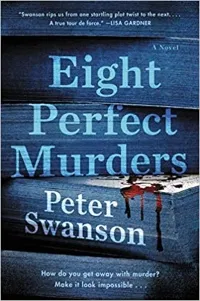“Eight Perfect Murders” by Peter Swanson – The Impossible Crime
Peter Swanson has certainly distinguished himself as a unique voice in the psychological suspense genre in the past few years, and he continues his fray into the realms of murder mystery with his most recent novel, Eight Perfect Murders.
Despite having lost some of the prestige it had in its golden age, the murder mystery genre nevertheless remains one of the most popular types of fiction in our very own modern day; there is something endlessly fascinating about watching a complex puzzle unfold surrounding the death of a person.
Without venturing to guess what it says about us (an entirely different topic), I think many of us can identify as aficionados of the genre, with our own list of favourites. In Eight Perfect Murders by Peter Swanson, we meet a bookseller, Malcolm Kershaw, who attempts to take this list to an objective level, compiling what he believes are the eight best and nigh-impossible to solve murder mysteries.
The works are all classics, from Agatha Christie's A. B. C. Murders to James M. Cain's Double Indemnity, and though the list might be morbid, it's still just a piece of fiction. Or at least, it was. One snowy day an FBI agent comes knocking at Mal's Old Devils Bookstore in Boston, with a rather surprising piece of news: his old list is coming to life.
More precisely, a recent series of murders seems to be following Mal's list down to the letter, and while he himself isn't much of a suspect, he finds himself rather unwittingly in the midst of a rather serious investigation.
What's worse, whatever interest he might hold for the FBI, it pales in comparison to the object of obsession he has become to the killer from the shadows. The killer who knows virtually everything about him, even the things Mal never told his recently-deceased wife. He's watching his every move, and the execution of his horrifying plan is only beginning.
Instead, it struck me rather early on this novel was more of an homage to many of the greatest works of murder mystery to have graced the light of day. All eight novels chosen by the main character are examined more profoundly than I anticipated, and if you intend on reading any of them for the first time in the future, be warned this book spoils their endings... although to be fair this seemed like a given to me.
As a matter of fact, I'd say about half of the book is spent examining these stories in one way or another, whether it's a direct study of their text or re-enactments of the events which transpired within. While it did feel like the author leaned a bit too heavily into this structural choice, I eventually came to appreciate it for the love letter it was to the pioneers of the genre.
Other than this, Swanson definitely does have some ideas of his own to mix in with the rest of the soup, and even though I can't exactly say any of them are groundbreaking, they do fit right in with the type of story he is trying to tell.
I think to enjoy this book, it's quite important to go into it from the perspective of it being a somewhat lighthearted retread of the many classic conventions and elements which have become staples of the genre.
No matter how much homage Swanson would like to pay to his favourite authors and novels, there is clearly a limit to how much he can borrow from their works, and I believe he understood this rather well.
Swanon's plot, the one surrounding the eight stories, is in and of itself a solid puzzle, but I'm going to say you will have a much better chance of figuring out the ending if you can identify a specific device he chose to use. There are plenty enough twists and turns to follow, and though in the moment many of them don't seem to make a lot of sense, in the end Swanson does manage to tie them together.
As a matter of fact, I would venture to say the mystery is quite engaging until the final chapters where all is finally revealed, and presents a decent challenge despite the presence of all the genre's elements we have become familiar with.
As far as our main character is concerned, Malcolm Kershaw definitely isn't the most likeable protagonist I've ever met, the kind you can't help but suspect of something for the duration of the novel. While I personally enjoy following protagonists I feel suspicious of, I could see why some people would much prefer someone likeable and relatable.
Eight Perfect Murders by Peter Swanson may not be the most original murder mystery novel, but it remains a very respectable love letter to the genre and its pioneering authors, all while still delivering a solid plot which hearkens back to the classic stories of decades past.
It follows the story of a bookseller who puts together a list of what he believes are the eight most perfect and nigh-unsolvable murders in fiction. Shortly after, someone starts bringing the list to life.
Peter Swanson Compiles the Murder List
Despite having lost some of the prestige it had in its golden age, the murder mystery genre nevertheless remains one of the most popular types of fiction in our very own modern day; there is something endlessly fascinating about watching a complex puzzle unfold surrounding the death of a person.
Without venturing to guess what it says about us (an entirely different topic), I think many of us can identify as aficionados of the genre, with our own list of favourites. In Eight Perfect Murders by Peter Swanson, we meet a bookseller, Malcolm Kershaw, who attempts to take this list to an objective level, compiling what he believes are the eight best and nigh-impossible to solve murder mysteries.
The works are all classics, from Agatha Christie's A. B. C. Murders to James M. Cain's Double Indemnity, and though the list might be morbid, it's still just a piece of fiction. Or at least, it was. One snowy day an FBI agent comes knocking at Mal's Old Devils Bookstore in Boston, with a rather surprising piece of news: his old list is coming to life.
More precisely, a recent series of murders seems to be following Mal's list down to the letter, and while he himself isn't much of a suspect, he finds himself rather unwittingly in the midst of a rather serious investigation.
What's worse, whatever interest he might hold for the FBI, it pales in comparison to the object of obsession he has become to the killer from the shadows. The killer who knows virtually everything about him, even the things Mal never told his recently-deceased wife. He's watching his every move, and the execution of his horrifying plan is only beginning.
An Homage to Classics in Eight Perfect Murders
There are definitely books out there for which people ought to manage their expectations before going in, and Eight Perfect Murders is without a doubt one of them. If you're looking for a completely original murder mystery story very loosely based on some classic works in the genre, then chances are you're going to be a little disappointed.
Instead, it struck me rather early on this novel was more of an homage to many of the greatest works of murder mystery to have graced the light of day. All eight novels chosen by the main character are examined more profoundly than I anticipated, and if you intend on reading any of them for the first time in the future, be warned this book spoils their endings... although to be fair this seemed like a given to me.
As a matter of fact, I'd say about half of the book is spent examining these stories in one way or another, whether it's a direct study of their text or re-enactments of the events which transpired within. While it did feel like the author leaned a bit too heavily into this structural choice, I eventually came to appreciate it for the love letter it was to the pioneers of the genre.
Other than this, Swanson definitely does have some ideas of his own to mix in with the rest of the soup, and even though I can't exactly say any of them are groundbreaking, they do fit right in with the type of story he is trying to tell.
I think to enjoy this book, it's quite important to go into it from the perspective of it being a somewhat lighthearted retread of the many classic conventions and elements which have become staples of the genre.
The Twisted and Contrived Mystery
Swanon's plot, the one surrounding the eight stories, is in and of itself a solid puzzle, but I'm going to say you will have a much better chance of figuring out the ending if you can identify a specific device he chose to use. There are plenty enough twists and turns to follow, and though in the moment many of them don't seem to make a lot of sense, in the end Swanson does manage to tie them together.
As a matter of fact, I would venture to say the mystery is quite engaging until the final chapters where all is finally revealed, and presents a decent challenge despite the presence of all the genre's elements we have become familiar with.
As far as our main character is concerned, Malcolm Kershaw definitely isn't the most likeable protagonist I've ever met, the kind you can't help but suspect of something for the duration of the novel. While I personally enjoy following protagonists I feel suspicious of, I could see why some people would much prefer someone likeable and relatable.
Now, like I said before, it would help one to think of this story as being an amalgam of the elements and conventions which have made the genre what it is, and this is also because Swanson is quite content to use them to advance the story rather than trying to break new frontiers with his own ideas. I don't think it's necessarily a negative: not every story needs to reach for the stars.
The Final Verdict
If you're quite alright with all these stipulations and are a fan of the genre, then I do recommend you give this book a shot.
 | Peter SwansonPersonal site Peter Swanson is an American author primarily known for his works in the psychological suspense genre. He published his first novel in 2014, titled The Girl with a Clock for a Heart, and his additional works include The Kind Worth Killing, Her Every Fear, and more recently, Eight Perfect Murders. |








Comments
Post a Comment